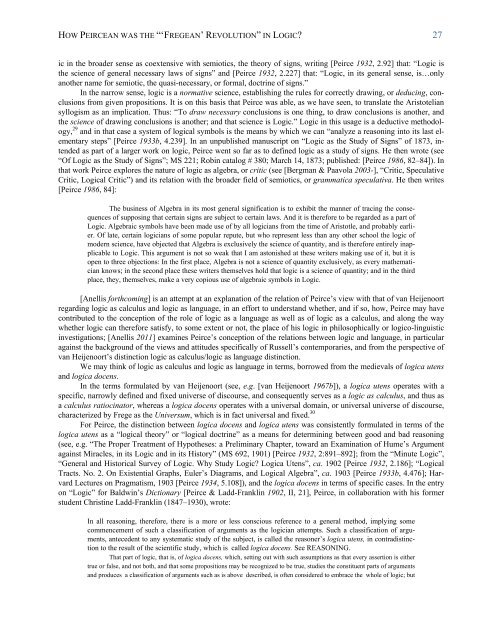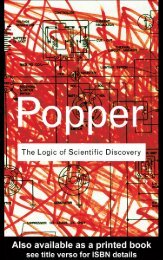You also want an ePaper? Increase the reach of your titles
YUMPU automatically turns print PDFs into web optimized ePapers that Google loves.
HOW PEIRCEAN WAS THE “‘FREGEAN’ REVOLUTION” IN LOGIC? 27<br />
ic in the broader sense as coextensive with semiotics, the theory of signs, writing [Peirce 1932, 2.92] that: “Logic is<br />
the science of general necessary laws of signs” and [Peirce 1932, 2.227] that: “Logic, in its general sense, is…only<br />
another name for semiotic, the quasi-necessary, or formal, doctrine of signs.”<br />
In the narrow sense, logic is a normative science, establishing the rules for correctly drawing, or deducing, conclusions<br />
from given propositions. It is on this basis that Peirce was able, as we have seen, to translate the Aristotelian<br />
syllogism as an implication. Thus: “To draw necessary conclusions is one thing, to draw conclusions is another, and<br />
the science of drawing conclusions is another; and that science is Logic.” Logic in this usage is a deductive methodology,<br />
29 and in that case a system of logical symbols is the means by which we can “analyze a reasoning into its last elementary<br />
steps” [Peirce 1933b, 4.239]. In an unpublished manuscript on “Logic as the Study of Signs” of 1873, intended<br />
as part of a larger work on logic, Peirce went so far as to defined logic as a study of signs. He then wrote (see<br />
“Of Logic as the Study of Signs”; MS 221; Robin catalog # 380; March 14, 1873; published: [Peirce 1986, 82–84]). In<br />
that work Peirce explores the nature of logic as algebra, or critic (see [Bergman & Paavola 2003-], “Critic, Speculative<br />
Critic, Logical Critic”) and its relation with the broader field of semiotics, or grammatica speculativa. He then writes<br />
[Peirce 1986, 84]:<br />
The business of Algebra in its most general signification is to exhibit the manner of tracing the consequences<br />
of supposing that certain signs are subject to certain laws. And it is therefore to be regarded as a part of<br />
Logic. Algebraic symbols have been made use of by all logicians from the time of Aristotle, and probably earlier.<br />
Of late, certain logicians of some popular repute, but who represent less than any other school the logic of<br />
modern science, have objected that Algebra is exclusively the science of quantity, and is therefore entirely inapplicable<br />
to Logic. This argument is not so weak that I am astonished at these writers making use of it, but it is<br />
open to three objections: In the first place, Algebra is not a science of quantity exclusively, as every mathematician<br />
knows; in the second place these writers themselves hold that logic is a science of quantity; and in the third<br />
place, they, themselves, make a very copious use of algebraic symbols in Logic.<br />
[Anellis forthcoming] is an attempt at an explanation of the relation of Peirce’s view with that of van Heijenoort<br />
regarding logic as calculus and logic as language, in an effort to understand whether, and if so, how, Peirce may have<br />
contributed to the conception of the role of logic as a language as well as of logic as a calculus, and along the way<br />
whether logic can therefore satisfy, to some extent or not, the place of his logic in philosophically or logico-linguistic<br />
investigations; [Anellis 2011] examines Peirce’s conception of the relations between logic and language, in particular<br />
against the background of the views and attitudes specifically of Russell’s contemporaries, and from the perspective of<br />
van Heijenoort’s distinction logic as calculus/logic as language distinction.<br />
We may think of logic as calculus and logic as language in terms, borrowed from the medievals of logica utens<br />
and logica docens.<br />
In the terms formulated by van Heijenoort (see, e.g. [van Heijenoort 1967b]), a logica utens operates with a<br />
specific, narrowly defined and fixed universe of discourse, and consequently serves as a logic as calculus, and thus as<br />
a calculus ratiocinator, whereas a logica docens operates with a universal domain, or universal universe of discourse,<br />
characterized by Frege as the Universum, which is in fact universal and fixed. 30<br />
For Peirce, the distinction between logica docens and logica utens was consistently formulated in terms of the<br />
logica utens as a “logical theory” or “logical doctrine” as a means for determining between good and bad reasoning<br />
(see, e.g. “The Proper Treatment of Hypotheses: a Preliminary Chapter, toward an Examination of Hume’s Argument<br />
against Miracles, in its Logic and in its History” (MS 692, 1901) [Peirce 1932, 2:891–892]; from the “Minute Logic”,<br />
“General and Historical Survey of Logic. Why Study Logic? Logica Utens”, ca. 1902 [Peirce 1932, 2.186]; “Logical<br />
Tracts. No. 2. On Existential Graphs, Euler’s Diagrams, and Logical Algebra”, ca. 1903 [Peirce 1933b, 4.476]; Harvard<br />
Lectures on Pragmatism, 1903 [Peirce 1934, 5.108]), and the logica docens in terms of specific cases. In the entry<br />
on “Logic” for Baldwin’s Dictionary [Peirce & Ladd-Franklin 1902, II, 21], Peirce, in collaboration with his former<br />
student Christine Ladd-Franklin (1847–1930), wrote:<br />
In all reasoning, therefore, there is a more or less conscious reference to a general method, implying some<br />
commencement of such a classification of arguments as the logician attempts. Such a classification of arguments,<br />
antecedent to any systematic study of the subject, is called the reasoner’s logica utens, in contradistinction<br />
to the result of the scientific study, which is called logica docens. See REASONING.<br />
That part of logic, that is, of logica docens, which, setting out with such assumptions as that every assertion is either<br />
true or false, and not both, and that some propositions may be recognized to be true, studies the constituent parts of arguments<br />
and produces a classification of arguments such as is above described, is often considered to embrace the whole of logic; but





